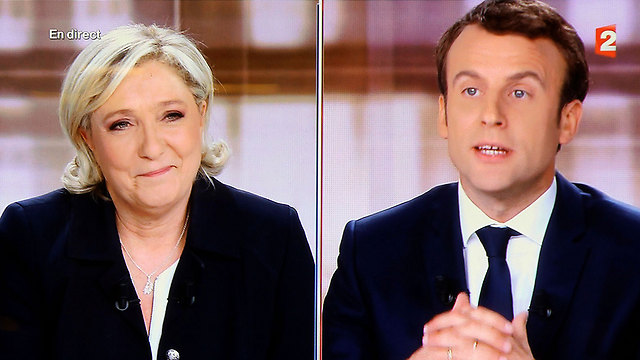While Frontrunner Macron calls Le Pen a liar and heir to her father’s anti-Semitic legacy, Le Pen makes a sly comment on Macron’s marriage and calls him an heir to unpopular President Hollande.
Looking to land—but not receive—a knockout blow, French presidential candidates Emmanuel Macron and Marine Le Pen faced off Wednesday night in a high-stakes, high-pressure, and immediately heated head-to-head debate on live primetime TV.
Both candidates came out swinging, in their last best chance to plug their polar-opposite visions and plans for France to the cohort of undecided electors who could sway Sunday’s vote.

Le Pen painted the former banker and economy minister as a servant of big business and finance, and declared herself “the candidate of the people, of the France that we love.”
He painted the far-right nationalist as an empty shell, shaky on details and seeking to profit politically from the anger of French voters — a dominant theme of the campaign.
“You lie all the time,” he said. “You propose nothing.”
She dismissed his economic proposals with sweeping critiques and bristled at his suggestions that she didn’t understand how finance and business works.
“You’re trying to play with me like a professor with a pupil,” she said.
Sitting opposite each other at a round table, neither pulled their punches. With both talking over each other, the debate quickly became a shouting match at times, with no common ground between the pro-European Union centrist candidate and the anti-EU Le Pen.
The debate offered risk and reward for both. A major trip-up or meltdown beamed direct into the homes of millions of electors could dent their presidential ambitions in the closing stages of the intense, suspenseful campaign that has, already, steered France into uncharted territory. The first round of voting on April 23 eliminated mainstream parties from the left and right and propelled the 39-year-old Macron, who has no major party backing, and the 48-year-old Le Pen into the winner-takes-all runoff on Sunday.
For both candidates, the meticulously calibrated TV face-off, organized in close collaboration with their campaign teams and held in a studio in northern Paris, was a first. Le Pen finished third in the last presidential election in 2012, locking her out of the traditional TV debate reserved for the top two vote-getters between rounds one and two.
Macron, a former investment banker and economy minister for outgoing Socialist President Francois Hollande, is running his first-ever campaign for elected office, with a year-old grassroots movement.
Le Pen said to Macron, a former economy minister and investment banker: “I’m the candidate of buying power. You’re the candidate of buying, buying up France.”
The anti-European Union Le Pen told Macron, a former economy minister and one-time investment banker, that for him, “the law of the strongest must apply.”
She said “radical” changes are needed to reduce the country’s 10 percent unemployment rate.
Differences included how to negotiate the 35-hour work week currently in place. Len Pen advocates talks by sector instead of by company.
She claimed Macron’s choices amount to “fratricide” because they pit one group, class or company against another.
Macron, for his part, derisively referred to far-rival Marine Le Pen as “an heir,” reminding voters that the name Le Pen has been an inglorious part of French politics for 40 years.
Macron told Le Pen at the start of their televised debate Wednesday: “You are the heir of a name, of a political party.”
It was a reference to her father, National Front party co-founded Jean-Marie Le Pen. He was expelled from the party in 2015 after he reiterated anti-Semitic comments.
Le Pen answered Macron’s “heir” comment by saying that he is heir to Hollande, who will be leaving the presidency with the lowest French president approval rating of the last 70 years.
In a first, this year’s presidential race also included TV debates before the April 23 round one, but those involved multiple candidates, not just two. Wednesday night’s debate, scheduled to run for more than two hours, immediately highlighted the gulf between Le Pen’s “French-first” protectionist proposals for a more closed France free from the EU and Macron’s vision of a proudly pro-EU France that keeps its borders open to trade and people.
Trailing in polls, Le Pen needed a knockout blow in the debate to eat decisively into the seemingly comfortable lead of Macron, the front-runner who topped round one, nearly three points ahead of Le Pen.
For Macron, the priority was to prevent Le Pen from making up ground in the race’s finishing straight.
As reported by Ynetnews
